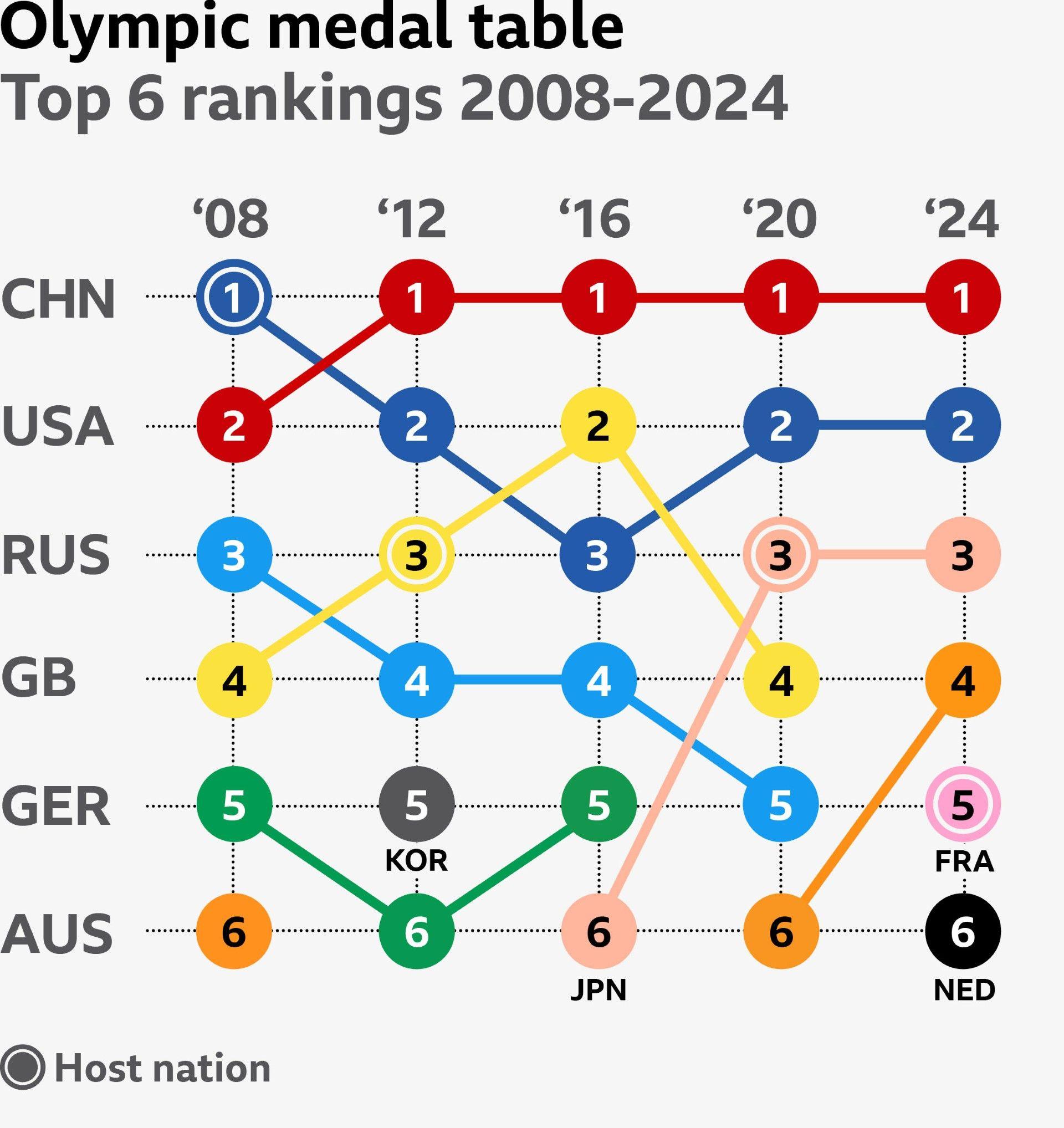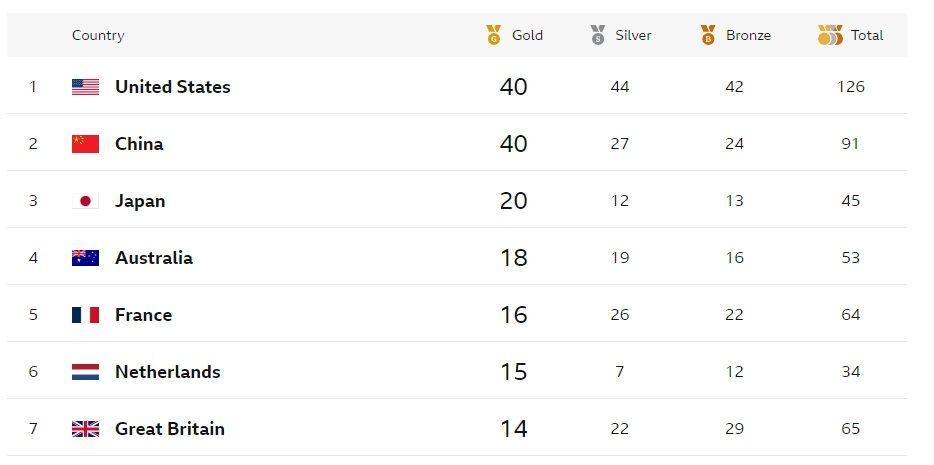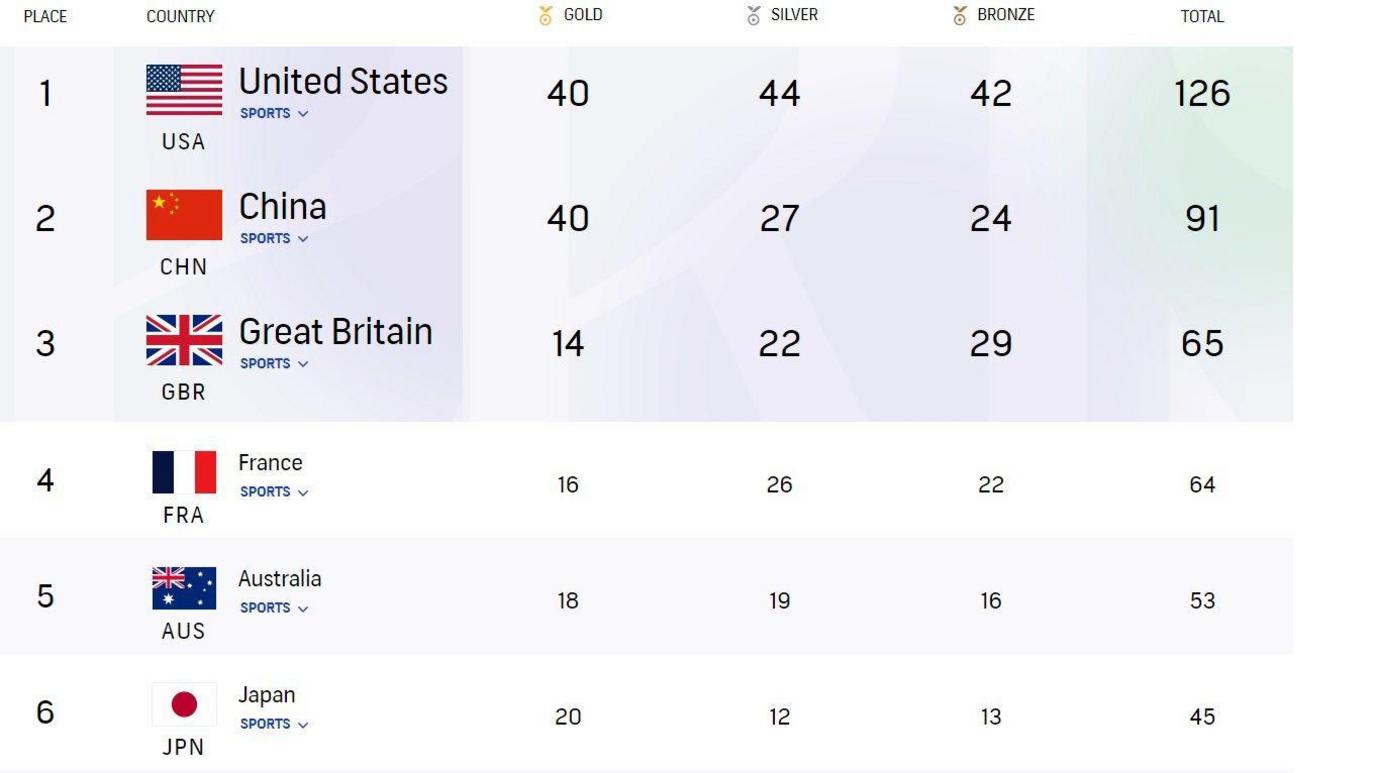How did Team GB win their Olympic medals?
Olympics 2024: Every Team GB Olympic medal in Paris
- Published
Let the celebrations begin - Team Great Britain have finished Paris 2024 with 65 medals, beating their total from Tokyo by one.
The total matches the team's medal haul from London 2012 and is the joint-third-highest for Team GB at a single Games behind Rio 2016 (67 medals) and London 1908 (146).
But GB did get eight fewer golds than they did three years ago in Tokyo.
In fact 14 golds was only good enough for seventh in the medal table, GB's lowest placing since Athens 2004.
This is because the official medal table is ordered by golds won.
So, was Paris 2024 a record-breaking Games or a backwards step? Let's go through the stats.

British fans have been spoiled at recent Games. Third in London, second in Rio and fourth in Tokyo.
Seventh almost feels like a disappointment.
But if we change the table from most golds to total medals won, things suddenly look much better.
And there is a precedent. The US media have been presenting Olympic medal tables this way for years.
Below is BBC Sport's official medal table from the Paris 2024 ordered by golds. Then take a look at what it looks like in the US media...


Team GB move up to third on the total medals table of broadcaster NBC
Plus, GB coming home with 14 golds would have been unthinkable 28 years ago.
Sir Steve Redgrave and Matthew Pinsent won the rowing men's coxless pair at Atlanta 1996 for GB's only gold, in case you were wondering.
What were GB's best sports at Paris 2024?
On medals won it was cycling, but on golds alone rowing was Team GB's best sport at Paris 2024.
Rowing last topped GB's medal table at Atlanta, but has joined cycling in number one.
With equestrian being GB's third-best sport based on golds, Paris was the Olympics for sports which required British athletes to be sitting down.
How much funding did Team GB get from UK Sport?
Money talks. UK Sport awarded £245,837,685 of funding for the Paris Olympic cycle.
It means each GB medal cost, on average, £3,782,118.
Cycling received £29,314,683, the most funding for any sport, followed by rowing (£23,794,482) and sailing (£22,800,520).
Hockey (£13,689,907) had the most funding of any sport in which GB did not win a medal in Paris.
UK Sport - funded by the government and National Lottery income - does not give Olympic funding to golf, making Tommy Fleetwood's silver GB's cheapest medal.
The next cheapest medal was Kate Shortman and Izzy Thorpe's silver in the artistic swimming women's duet. Artistic swimming received just £467,250 from UK Sport.
Which region won most GB medals?
If we go by place of birth London was Britain's best source of medals with 32, just short of Germany's total of 33.
The South East of England contributed 21, the West Midlands 14 and the North West of England and Yorkshire were locked together on 12. Yorkshire was briefly and famously above Australia in the London 2012 medal table. No such luck this time but a dozen medals was still the equal of Ukraine and one more than Sweden.
Scotland took home 10, the same as Belgium, Wales seven like Croatia and Northern Ireland four, joining Portugal on that haul.
Any other Team GB medal stats?
Of course!
In the battle of the sexes British male athletes won 31 medals, with female athletes winning 30. Four of GB's medals were in mixed events.
The average age of British medallists was 27 years and three months. The youngest winner was 16-year-old skateboarder Sky Brown. The oldest was 57-year-old dressage rider Carl Hester.
Thanks to McEwan, Pidcock, Dean, Digby, Ford, Daley, George and Fleetwood the most common first name for a GB medallist was Thomas.
So, if you are a 23-year-old male rower living in London called Tom - get training now. You are our best hope for Los Angeles 2028!
Related topics
- Skateboarding
- Canoeing
- Sailing
- Weightlifting
- Archery
- Diving
- Taekwondo
- Handball
- Tennis
- Hockey
- Golf
- Sport Climbing
- Swimming
- Volleyball
- Basketball
- Equestrian
- Athletics
- Wrestling
- Gymnastics
- Rugby Sevens
- Rowing
- Olympic Games
- Surfing
- Fencing
- Cycling
- Boxing
- Table Tennis
- Badminton
- Football
- Judo
- Shooting
- Water Polo
- Modern Pentathlon
- Triathlon